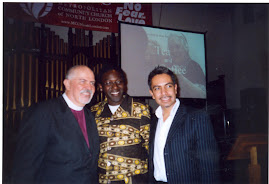
Prayer And Praise in London 6th May 2010 @ House Of Rainbow Fellowship, 6.30pm, call 0208558 3485 or 07507510357 for more info, visit www.houseofrainbow.org

www.rjmm.co.uk Rowland Jide Macaulay, LLB, MTh, FACT is a Christian Theologian, openly gay, a dynamic and an inspirational speaker, poet, pastor and preacher, Human Rights Consultant, the author of “Poetry Inspired” published in the UK 2001, founder/Project Director of House Of Rainbow Fellowship Worldwide, holds a degree in law and MA Practical Theology.

If You Can Walk,
You Can Dance,
If You Can Talk,
You Can Sing.
